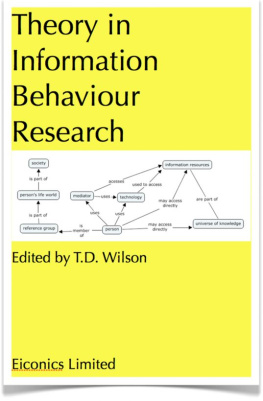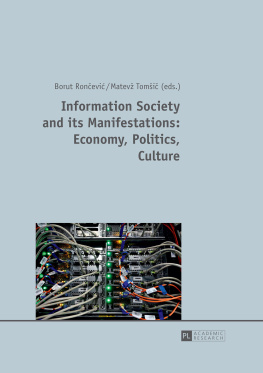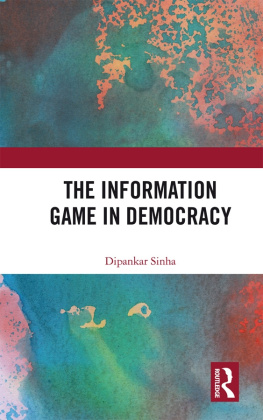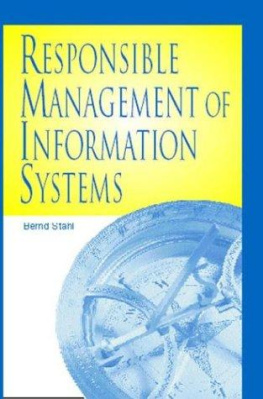
A Normative Theory of
the Information Society
Routledge Research in Information Technology and Society
1Reinventing Government in the
Information Age
International Practice in
IT-Enabled Public Sector Reform
Edited by Richard Heeks
2Information Technology in
Government
Britain and America
Helen Margetts
3Information Society Studies
Alistair S. Duff
4National Electronic Government
Building an Institutional
Framework for Joined Up
Government A Comparative
Study
Edited by Martin Eifert and Jan
Ole Pschel
5Local Electronic Government
A Comparative Study
Edited by Helmut Drke
6National Governments and
Control of the Internet
A Digital Challenge
Giampiero Giacomello
7The Politics of Cyberconfl ict
Security, Ethnoreligious and
Sociopolitical Confl icts
Athina Karatzogianni
8Internet and Society
Social Theory in the Information
Age
Christian Fuchs
9Hacking Capitalism
The Free and Open Source
Software Movement
Johan Sderberg
10Urban Youth in China
Modernity, the Internet
and the Self
Fengshu Liu
11Network Governance of Global
Religions
Jerusalem, Rome, and Mecca
Michel S. Laguerre
12Migration, Diaspora and
Information Technology in
Global Societies
Edited by Leopoldina Fortunati,
Raul Pertierra and Jane Vincent
13A Normative Theory of the
Information Society
Alistair S. Duff
A Normative Theory of
the Information Society
Alistair S. Duff
First published 2012
by Routledge
711 Third Avenue, New York, NY 10017
Simultaneously published in the UK
by Routledge
2 Park Square, Milton Park, Abingdon, Oxon OX14 4RN
Routledge is an imprint of the Taylor & Francis Group,
an informa business
2012 Taylor & Francis
The right of Alistair S. Duff to be identified as author of this work has
been asserted by him in accordance with sections 77 and 78 of the Copyright,
Designs and Patents Act 1988.
Printed and bound in the United States of America on acid-free paper by
IBT Global.
All rights reserved. No part of this book may be reprinted or reproduced or
utilised in any form or by any electronic, mechanical, or other means, now
known or hereafter invented, including photocopying and recording, or in
any information storage or retrieval system, without permission in writing
from the publishers.
Trademark Notice: Product or corporate names may be trademarks or
registered trademarks, and are used only for identification and explanation
without intent to infringe.
Library of Congress Cataloging-in-Publication Data
Duff, Alistair S., 1961-
A normative theory of the information society / Alistair S. Duff.
p. cm. (Routledge research in information technology and society;
13)
Includes bibliographical references and index.
1. Information society. I. Title.
HM851.D843 2011
303.48'3301dc23
2011029054
ISBN: 978-0-415-95571-3 (hbk)
ISBN: 978-0-203-13775-8 (ebk)
Acknowledgments
A sequel and companion volume, although freestanding, to my Information Society Studies (Routledge 2000), this book was initially drafted during a sabbatical partly spent at the University of Oxford, with generous funding from the Arts and Humanities Research Council. I am grateful to William H. Dutton and company at the Oxford Internet Institute, and to Hazel Hall, Robert Beveridge and other colleagues at Edinburgh Napier University who helped me bear the cross of interdisciplinary work. Going further back, my education benefi ted from the input of eminent political philosophers such as Peter Winch, G. A. Cohen and Michael Lessnoff and information scientists such as Blaise Cronin and A. J. Meadows. The bibliography registers numerous (some might say, too many) additional influences, not least that of Daniel Bell, whose writings first inspired my interest in the information society thesis. I am thankful to Max Novick, Terry Clague and others at Routledge for having confidence in this project, recklessly ambitious (I can now see) though it was. I wish also here to remember my father, Robert S. Duff (19201989), who alongside his achievements as a cardiologist, founded in the late-1970s a small company called The Information Corporation; perhaps he had heard the faint heartbeats of an embryonic society. My main debt, however, must be to Elizabeth, for her indefatigable support of myself and our children, Alexander, Ruaridh and Laura.
Although this monograph comprises original work throughout, early versions of some ideas were published as follows (in chronological order):
Social democracy and information media policy, in B. Rockenbach and T. Mendina (eds) Ethics and Electronic Information: a Festschrift for Stephen Almagno (Jefferson, NC: McFarland & Co., 2003), pp. 15465.
Social welfare aspects of information with special reference to news, in Proceedings of the IADIS (International Association for Development of the Information Society) International Conference on e-Society , vol. 2, Lisbon, Portugal, June 36 2003 , pp. 7736.
Ethical messages: R. H. Tawney confronts the information age, Ethical Space 1(3) 2004, pp. 1720 (with R. Melville).
For a new nanny state: the role of national information services in postindustrial societies, in T. Mendina and J. J. Britz (eds) Information Ethics in the Electronic Age: Current Issues in Africa and the World (Jefferson, NC: McFarland & Co, 2004), pp. 155-62
The past, present, and future of information policy: towards a normative theory of the information society, Information, Communication & Society 7(1) 2004, pp. 69-87
The sickness of an information society: R. H. Tawney and the post-industrial condition, Information, Communication & Society 7(3) 2004, pp. 403-22
Social engineering in the information age, The Information Society 21(1) 2005, pp. 6771.
Laying a foundation of fact: Fabianism and the information society thesis, Information, Communication & Society 9(4) 2006, pp. 54162.









